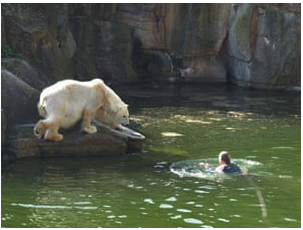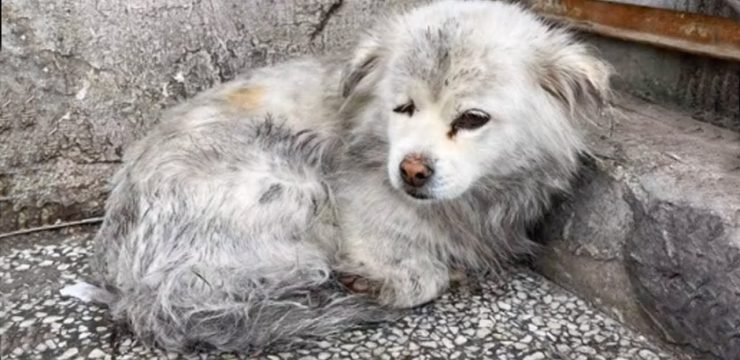In a shocking incident at the Berlin Zoo, a polar bear attack left a woman hospitalized after a harrowing experience. The woman, identified as 32-year-old Mandy K, reportedly found herself in a dire situation that began as she attempted to enter the bear enclosure. Reports indicate that Mandy climbed over a fence, through some bushes, and over a wall to reach the area where the zoo’s polar bears reside, all while these animals were being fed by the zookeepers.
The zookeepers, upon realizing her presence within the enclosure, rushed to help, desperately trying to avert an attack by distracting the bears. Despite their quick response, one bear approached Mandy and began biting her. The bear inflicted injuries on her arms, legs, and back as zookeepers worked to distract the animal and rescue her from the dangerous situation.

This situation became particularly intense, as six zookeepers worked in unison to fend off the bear while keeping the other bears at bay. These efforts allowed the zoo staff to finally scare the attacking bear away from Mandy, enabling them to pull her out of the enclosure to safety. While Mandy is now in stable condition following surgery to repair her injuries, the incident has sparked conversations about the woman’s motives and the inherent dangers that led to this situation.
Mandy K, who is currently recovering in the hospital, is reportedly a teacher who has faced considerable challenges in her personal and professional life. After a period of unsuccessful job hunting, Mandy began experiencing feelings of hopelessness, which may have contributed to her actions that day. This incident has raised questions about how despair and stress can sometimes lead people to make drastic, even dangerous, choices. The incident serves as a reminder of the importance of mental health resources and support, especially for those facing prolonged career setbacks or emotional strain.
Zoo officials have expressed their shock at the event, emphasizing that strict protocols and protective barriers are in place specifically to prevent such occurrences. The Berlin Zoo has long been committed to the safety of both its visitors and its animals, ensuring that adequate measures are taken to keep people at a safe distance from the enclosures. This incident, however, has led to discussions on whether additional safety measures or deterrents could help further prevent individuals from accessing restricted areas. Visitors are routinely warned of the dangers posed by the animals, particularly large predators such as polar bears, who, despite being captivating, remain wild animals with potentially lethal instincts.
Polar bears, the largest carnivores on land, are highly unpredictable and powerful animals, capable of causing severe harm to humans. Even in a controlled environment like a zoo, their wild instincts remain, making them formidable creatures that require respect and caution. This incident has brought to light the pressing need for people to understand the risks associated with wild animal interactions, even in captivity. The Berlin Zoo and other institutions hope to reinforce this awareness among the public to avoid future incidents that could endanger both humans and animals alike.
Furthermore, zoo staff and animal welfare experts have noted that such incidents can also have unintended consequences for the animals. When humans enter animal enclosures uninvited, it can create distress not only for the individuals involved but also for the animals. In many cases, wild animals in captivity become agitated or stressed by the presence of intruders, leading to behaviors that could be harmful to them. In some zoos, after incidents like this, animals have had to be isolated, relocated, or even euthanized in rare cases if they are perceived as a continuing danger.
Mental health professionals emphasize the importance of seeking help for feelings of hopelessness and despair. For individuals like Mandy, who may be dealing with the emotional toll of unemployment or personal challenges, there are various forms of support available, from counseling to job search assistance and community resources. Situations like these underscore the need for accessible mental health resources for people of all backgrounds and situations.

In the wake of this event, Berlin Zoo officials and local authorities are likely to review the zoo’s safety protocols to see if additional barriers or warning signs might prevent future breaches. They are also working with city officials to consider whether increased security measures could help discourage others from attempting to enter dangerous areas. The zoo has reiterated its commitment to maintaining a safe environment for its animals and guests and stressed that visitors must respect the barriers and follow the zoo’s rules for everyone’s safety.
As Mandy recovers from her injuries, there is hope that she can find the support she needs to overcome her difficulties and regain a sense of purpose and stability. This event serves as a poignant reminder of the hidden struggles many people face and the ways those struggles can lead to unintended consequences. It also highlights the importance of empathy and understanding toward individuals experiencing difficult times and the value of providing resources that offer guidance, hope, and reassurance.
In conclusion, while the polar bear attack at the Berlin Zoo shocked both the local community and the zoo staff, it has sparked important conversations about mental health, personal safety, and public awareness. By learning from incidents like this, society can better address the needs of individuals facing emotional challenges while ensuring that places like zoos remain safe and enjoyable for all.





